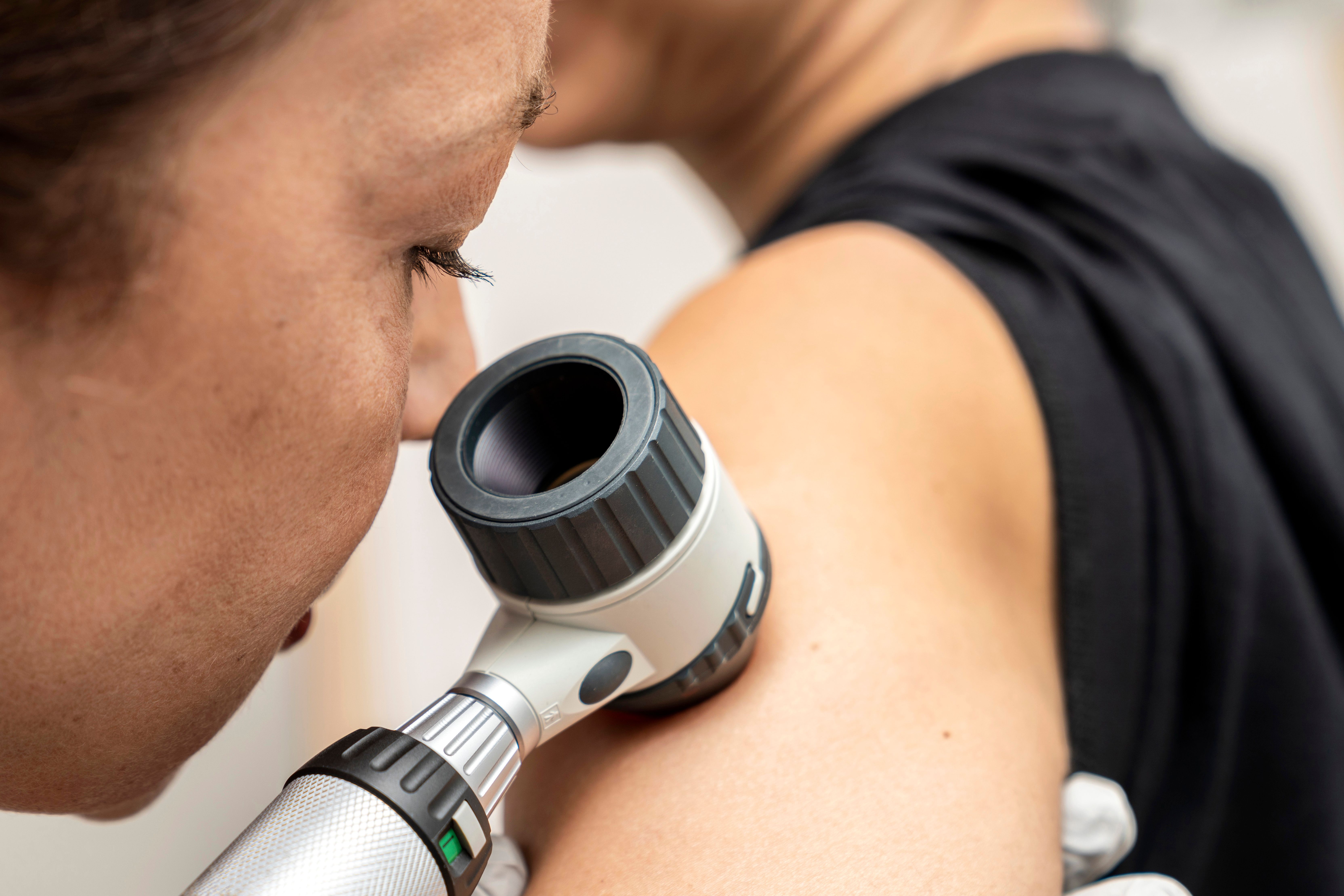- Center on Health Equity & Access
- Clinical
- Health Care Cost
- Health Care Delivery
- Insurance
- Policy
- Technology
- Value-Based Care
Stigma, Discrimination Impact Sexual and Gender Minority Perspectives on Full-Body Skin Examinations, Study Finds
A survey revealed the influence of prior stigmatic or discriminatory experiences on sexual and gender minority (SGM) patients’ perceptions of screening for skin cancer, stressing the need for affirming clinical settings.
Discrimination and stigma against sexual and gender minority (SGM) patients can negatively impact their experiences with skin cancer screening, according to a recent study published in JAMA Dermatology.
Dermatologist Examining Skin | image credit: ARTPhoto - stock.adobe.com

One of the tools deployed for skin cancer prevention is a full-body skin examination (FBSE), which are typically performed by a dermatologist but can be conducted by a primary care physician. As the name suggests, a clinician examines a patient’s skin from head-to-toe, including the scalp, in between digits, behind the ears, and more. These examinations can be brief as the clinician keeps an eye out for any abnormalities, moles, or discolorations of concern. A biopsy may be ordered if any spots in particular grab the clinician’s attention. Conducting these examinations is important for the earlier detection of skin cancers and assessing a patient’s risk, which can minimize the future costs of treatment and increase prognostic outcomes in patients.2
Minimal research has been conducted to investigate FBSEs in SGM patients. The authors of the current study pointed to 2 studies that suggested patients of sexual minorities undergo FBSEs more frequently than patients who are heterosexual. However, the data concerning patients belonging to gender minorities is very limited. To expand this knowledge, researchers sent out a survey to individuals of SGM to gather information on their perspectives and perceptions of FBSEs.
Data were gathered from the University of Chicago REDCap platform between June 20, 2022 and April 20, 2023. Participants were recruited from social media, email lists, universities, community centers, and partnering clinics. All participants self-identified as lesbian, gay, bisexual, transgender, queer or questioning, or other (LGBTQ+).
A total of 175 individuals responded, 75 (42.8%) of which had previously experienced an FBSE. A third (n = 25) of those who underwent an FBSE reported levels of discomfort in the exam; these feelings were more likely to be reported by individuals who identify as gender queer, nonbinary, or gender nonconforming compared with those who identify as cisgender (57.7% vs 25.6%; P = .001). Within the cisgender subgroup, the researchers noted that female patients had a higher likelihood of reporting discomfort compared with their male counterparts (37.5% vs 11.1%; P = .001).
Transgender, cisgender female, and gender queer participants had a higher likelihood of reporting discomfort related to undressing in the FBSE than cisgender males (66.7% vs 14.8%; P < .001). Additionally, individuals in these groups were more likely to report nonaffirming or discriminatory experiences with staff or medical professionals than cisgender males (28.6% vs 3.7%; P < .001).
Interactions where a patient was misgendered were more commonly reported by transgender and gender queer patients compared with cisgender males or females (38.5% vs 2.3%; P < .001). Additionally, uncomfortable examination maneuvers were also more highly reported by transgender and gender queer patients than cisgender individuals (38.5% vs 4.7%; P < .004).
Notably, 23 of the 100 participants who were yet to experience an FBSE expressed hesitation or discomfort with receiving one. Of this group, 11 patients noted prior discriminatory or nonaffirming experiences in medical settings that were connected to their SGM identity.
These survey results underscore the importance of clinicians being aware of the influences that stigma, discrimination, and past experiences have on patient perceptions of medical exams like FBSEs. Given that prior screening interactions can turn into barriers for patients, the authors concluded by emphasizing the need to gather information about patients’ gender identity and sexual orientation to create more affirmative environments in assessments like FBSE.
References
1. Verghese M, Freeman JQ, Connor BW, Hazra A, Fisher AR, Rosenblatt AE. Perspectives on full-body skin examinations among sexual and gender minority patients. JAMA Dermatol. Published online Jan 31, 2024. doi: 10.1001/jamadermatol.2023.5821
2. Annual exams: Five easy steps to prepare yourself. Skin Cancer Foundation. Accessed January 31, 2024. https://www.skincancer.org/early-detection/annual-exams/
